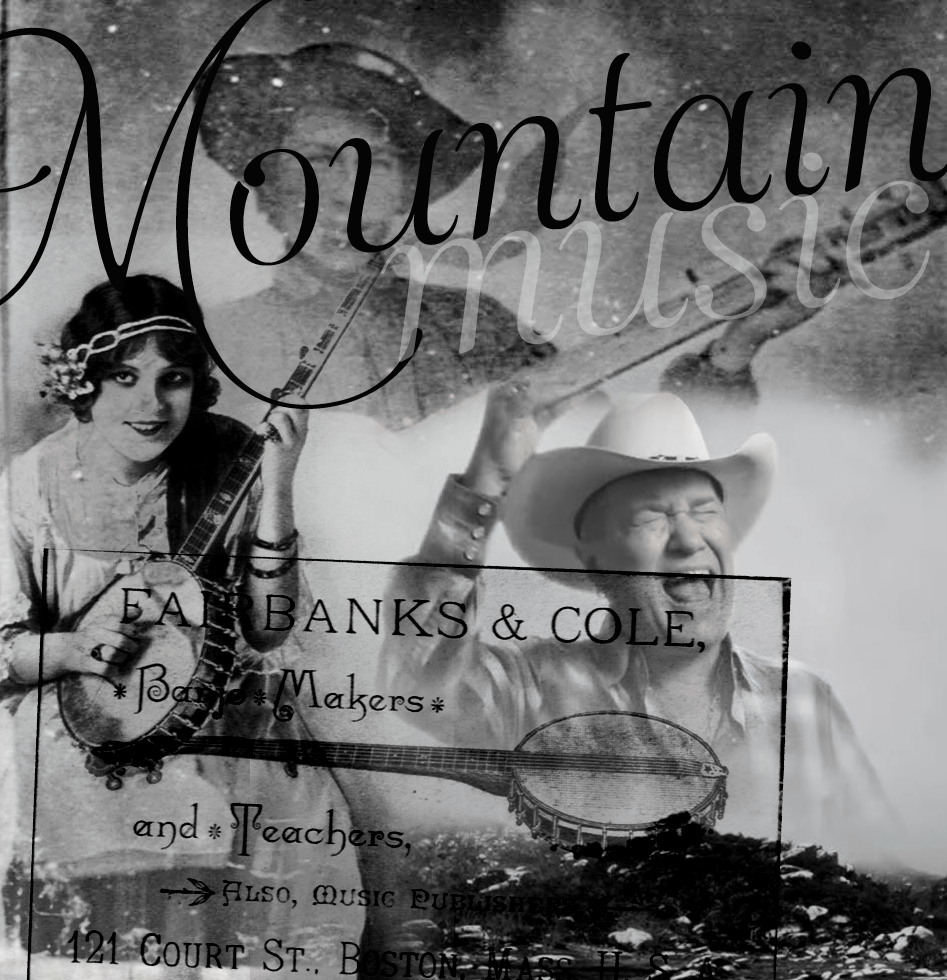Did African Americans Invent the Banjo?
Written By: Diary of a Whitey 4/13/2024
Once again I find myself Debunking the historical & cultural theft of White European American history and other Ethnic group’s history, which is constantly being stolen by cultural Marxists.

Beyonces a Great role model says “Michael Obama
Of course, this debate of whose culture is who’s started when
Beyonce Decided to Culturally appropriate country music
Guess what? white people weren’t having it, this claim has netted Beyonce fans such as “tizzyent” to literally claim that Country Music is a black origination, via banjo. Really? He further states that the banjo was a “stolen creation of Africa” and therefore “Country wouldn’t be country without blacks”.
I have debunked the false stories of Betty Boop’s origination of being black on my blog and I will debunk the myth that Country Music and the banjo’s Origination is “from African Americans” once again.
The First claim that’s made is Country music comes from Africa
These Marxist state ” because the Africans brought the banjo over to the Americas and slave owners stole the design”. They further discredited the inventor of the banjo “Joel Sweeney” claiming Joel Sweeney the inventor of the banjo Stole the idea from slaves stating its original name was “banjar”.
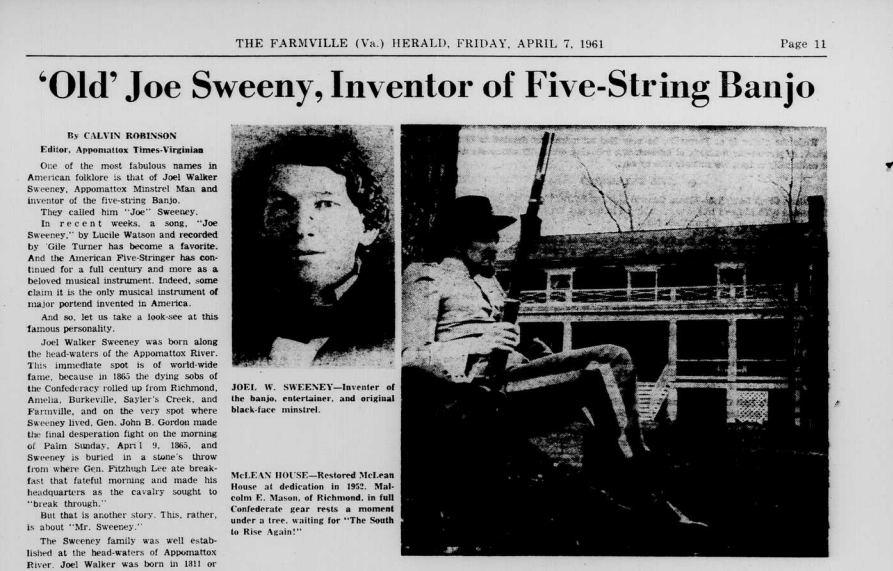
Joe Sweeney- Inventor of the five-string Banjo source credit- library of Congress
The word Banjar is not West African, I
The origination of banjar comes from Bali, Bali is not a country, but an island located in Indonesia.
There is zero historical data or mention of a musical instrument called a “banjar” other than some unreputable random blogs tying it to Africa. Other names “banjil” banjar, banza, bangoe, bangie, and banshaw, origination is Indonesian, is also not West African.

There is zero historical data or mention of a musical instrument called a “banjar” in Africa.
The Rumor was started by various bloggers and biased educational scholars who misinterpreted or misled readers by stating Thomas jeffersons letters mention Africans who brought a banjar from Africa being the original guitar, however, the Criticism of this “supposes the letters to be published under his name to be genuine” which says it would not be of an easy investigation to prove this.
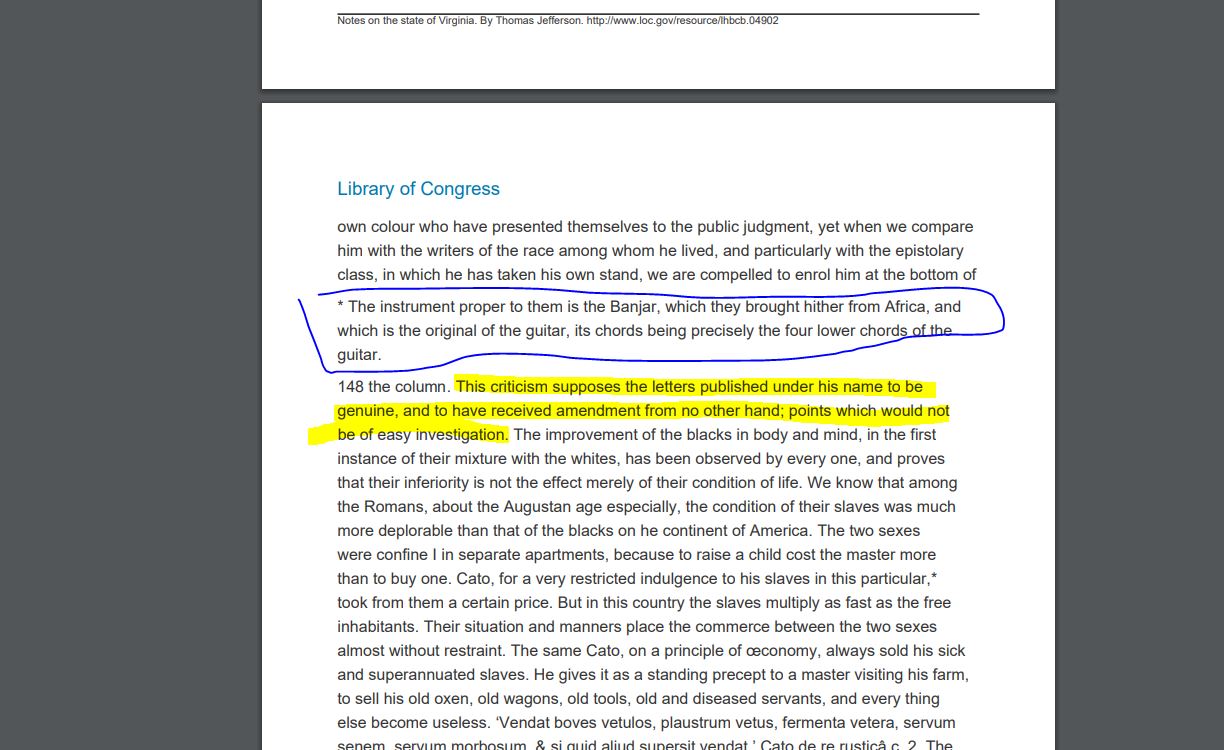
According to the Library of congress there are No evidence writings, about a “Banjar from Africa”- were written by Jefferson
Furthermore, it is interpreted that Given the history of Jeffersons’ writings, it is highly unusual for him to write such things. Therefore, given there is no original or proof there is no validity to this claim.
Furthermore, When digging into any historical references to a “banjar” it does not exist at all. The word is not even an African word.
So in Africa, there is no instrument called the banjo, The only instrument that resembles anything close is called the Kora. The Kora has 21 strings and is plucked to play. Its first known use was in 1799. It is a long-necked harped lute, not a banjo.
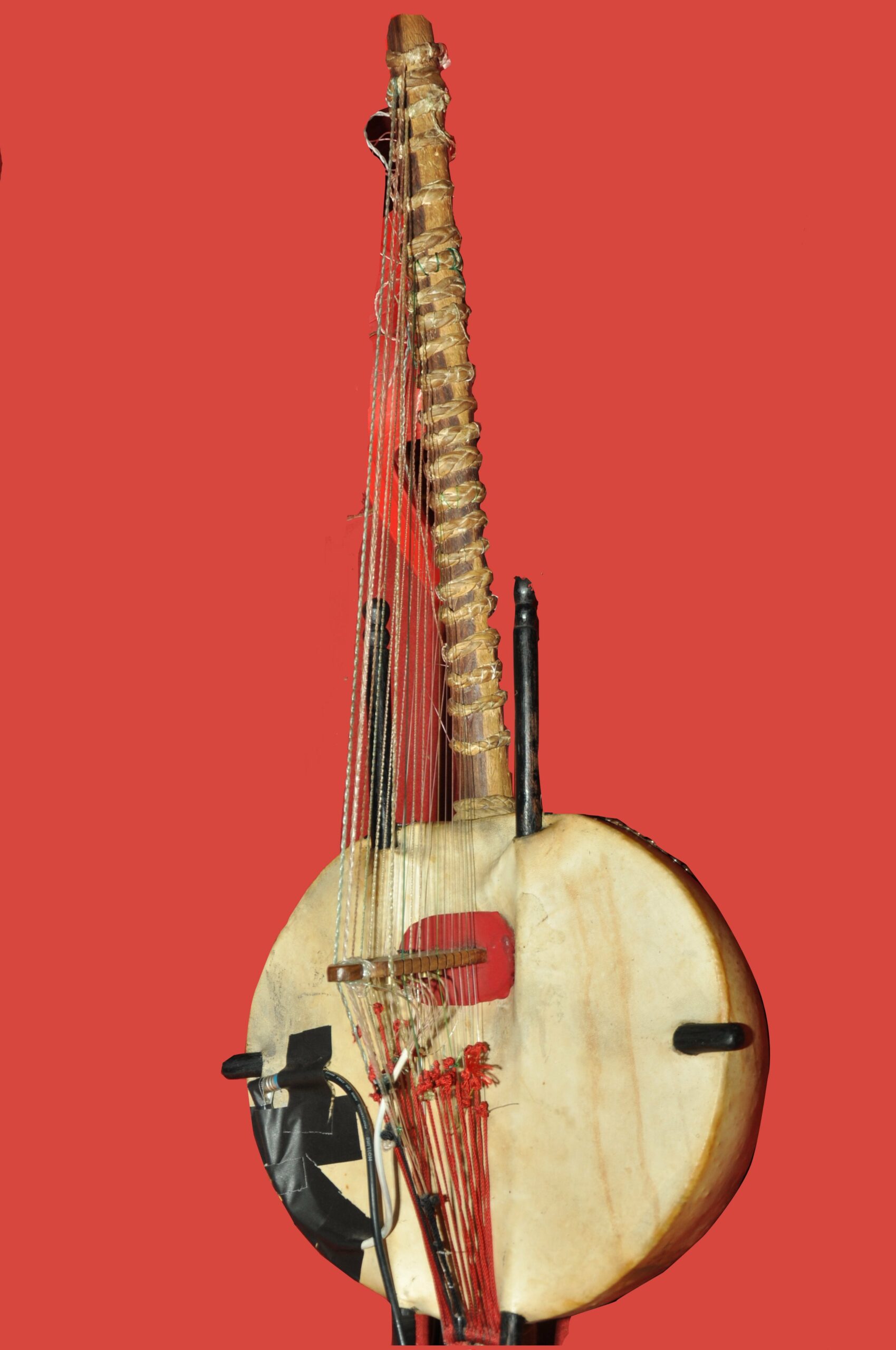
in Africa, there is no instrument called the banjo
The Banjo has five strings and does not have a harp-like sound like the so-called kora, The Banjo is belongs to the lute (guitar) family The kora belongs to the Harp family technically speaking it is a chordophone instrument with a bridge system; membranophone; with a calabash building the acoustic box; and it belongs to the double strung harps family.
The Banjo and the Kora are both considered lutes however there are several kinds of lutes so this is where it gets confusing, the Kora is part of the harp family a multi-stringed instrument by just plucking its strings and A lute is a mandolin-like instrument played by noting strings with one hand and plucking or strumming with the other.mandolin (n.)
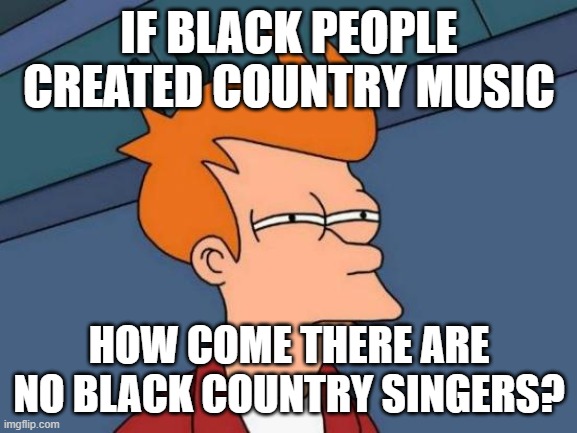
If Black americans were the original creators of country music, How come there are no country music singers?
“a lute-like musical instrument with four to six single or double metallic strings stretched over an almond-shaped body and fretted neck,” 1707, from French mandoline, from Italian mandolino, diminutive of mandola, a larger kind of mandolin, altered from Late Latin pandura “three-stringed lute,” from Greek pandoura, a three-stringed musical instrument, which is of unknown origin but probably foreign. Beekes compares Armenian p’andir, Georgian panturi. “The tone is tinkling, but penetrating and agreeable” [Century Dictionary]. Related: Mandolinist.
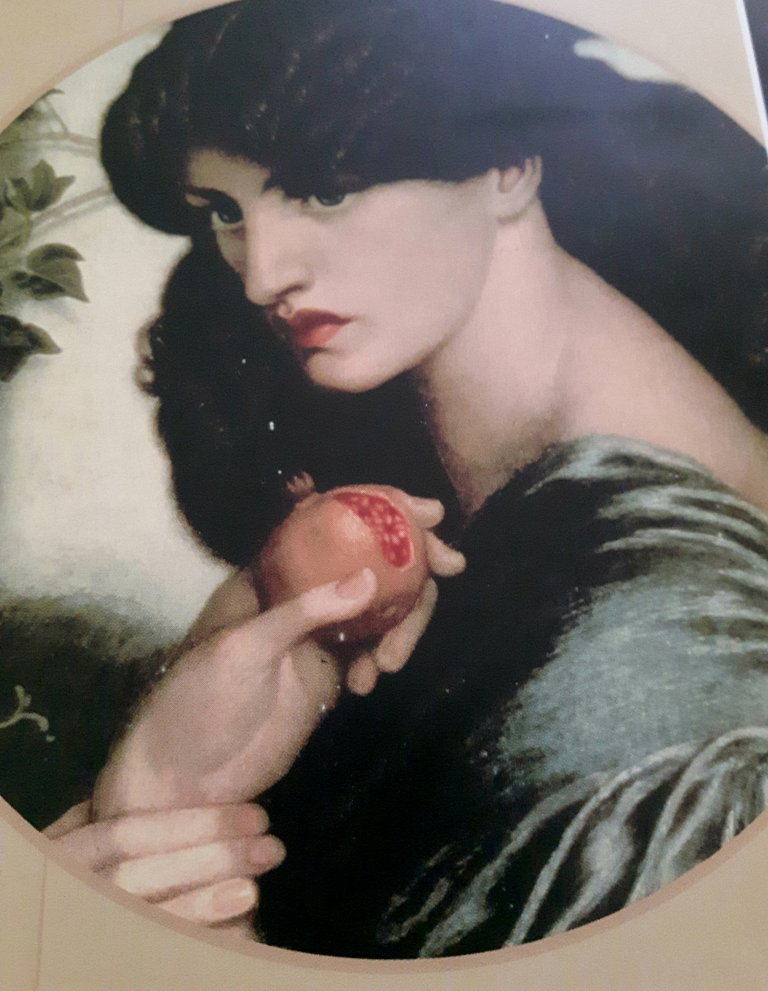
The word Kora is originated from Greece 15th century BC. Kora is a gender-neutral name with Greek origins meaning “maiden.”
The word Kora originated in Greece 15th century BC. Kora is a gender-neutral name with Greek origins meaning “maiden.” This historical name can be traced back to Greek mythology and the story of Persephone or Kore as she’s sometimes known.
The only other culture to use the word Kora is Tibet
Kora (Tibetan: སྐོར་ར, Wylie: skor ra, THL Simplified Phonetic Transcription: kor ra) is a transliteration of a Tibetan word that means “circumambulation” or “revolution”. Kora is both a type of pilgrimage and a type of meditative practice in the Tibetan Buddhist or Bon traditions.
The so-called “West African Kora” looks a lot like the Tibetan piwang and the Dra-nyen. The word Kora originated from the Greeks it was later used by Tibetans and the word is literally based on Persephone, or Kore, queen of the Underworld.

Chinese ruan instrument which predates the kora
Additionally, we have the Saraswati venna , the sitar and tanpura from India that pre-dates Africa’s so-called “kora” and China has its own instrument that resembles the kora as well as the Yueqin. The Ancient Chinese ruan is the only thing that comes close to the banjo.
However Th Chinese, Nor India nor Tibetans are claiming country music as their own. Mountain Music by Appalachian whites has a distinct cultural sound all of its own and is not at all taken or inspired by them.

Indian Instrument Veena which is much like the kora
Here are 30 classic vintage Appalachian Mountain Bluegrass songs to compare them too
https://www.youtube.com/watch?v=HqDE_nPLvWA
Here is the harp-lute (Kora) being played
https://www.youtube.com/watch?v=WjdWVNRVO1I
It sounds absolutely nothing like the American bluegrass country.
In addition, We have white Europeans in the Dark Ages way before slavery with instruments that pre-date Africa such as the dulcimer, original lute, hurdy gurdy, harp, tabor, Psaltery, sackbut, shawm, harpsichord, medieval lute, Cittern, Gittern, Citole, and Rebec
the Mandora which entered into France from Spain has said to get its original design from the gittern
The Gittern Predates all the instruments listed above getting its start in the 13th century which is a white European invention.
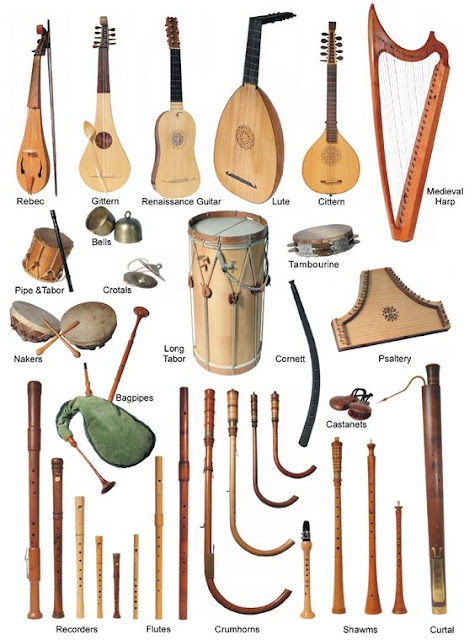
instruments
from medieval europe.
The gittern is a stringed musical instrument that played a significant role in European music from the late Middle Ages through the Renaissance. It is often considered a precursor to modern guitars and mandolins.
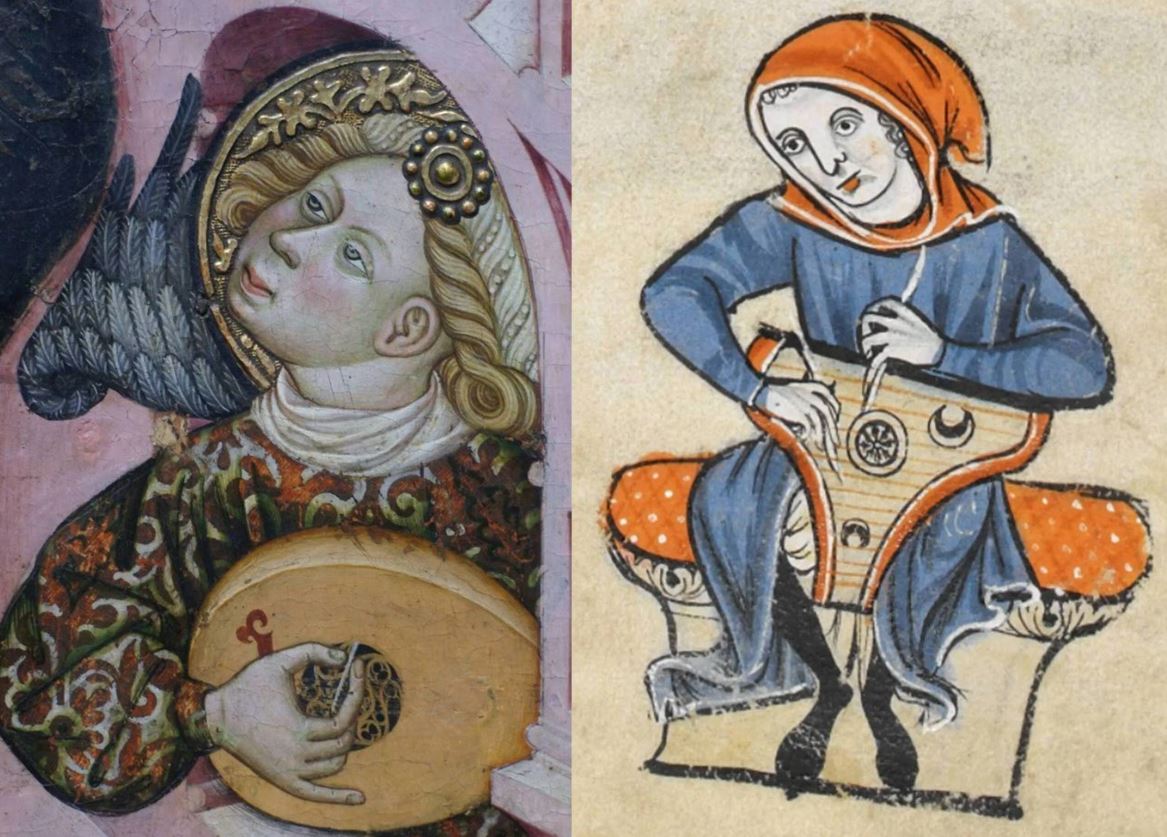
13th century paintings of the gittern
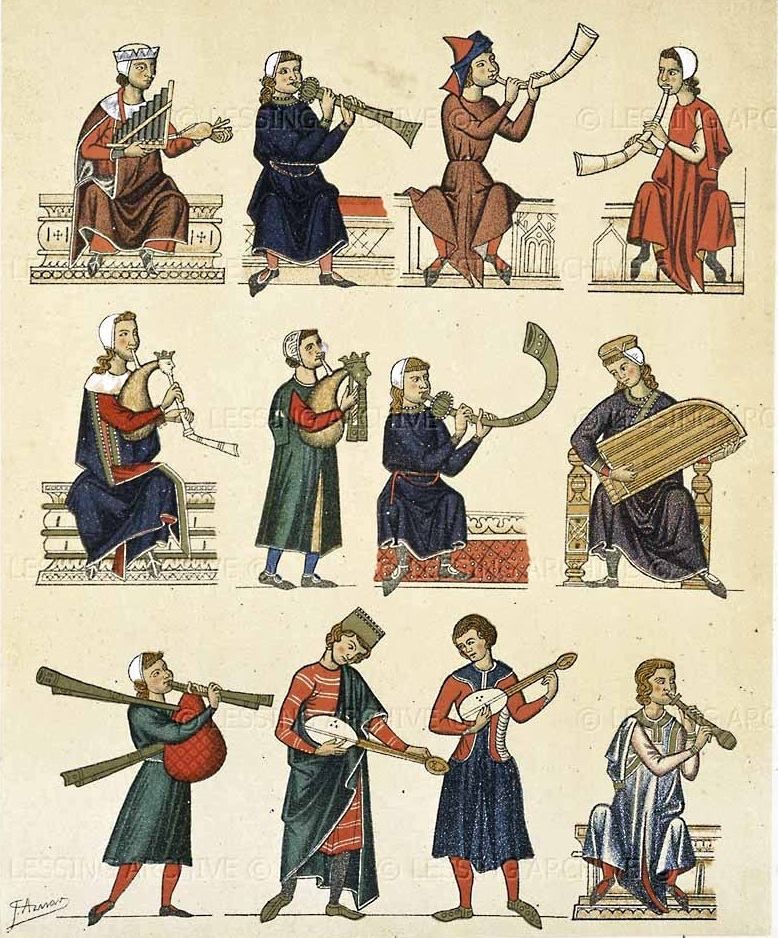
European Instruments from the 13th-15th century
Origins and Development:
Time Period: The gittern was first developed in the 13th century
Etymology: The name “gittern” comes from the Old French word “guiterne,” which was derived from the Latin “cithara,” a term that refers to ancient stringed instruments. This etymology indicates the gittern’s connection to a long tradition of lute-like instruments across Europe and the Mediterranean.
Construction: Gitterns were typically small, with a rounded back similar to that of a lute. They had multiple strings, which were plucked with the fingers or a plectrum. The body was typically carved out of a single piece of wood, a design feature that distinguished it from the lute, which usually had a separate soundboard attached to a ribbed back.
Appearance and Use: Early depictions show that gitterns had a relatively flat body compared to lutes, a distinct pegbox (often at an angle from the neck), and no supporting frets on the neck initially—though frets were added in later designs.
Cultural Significance: The gittern was a common instrument in medieval courts and urban settings, often used to accompany singers or in ensembles. It appears frequently in art from the period, indicating its popularity and cultural significance.
Influence and Legacy:
The gittern contributed to the development of other stringed instruments, including modern guitars and mandolins. Its design and playing technique influenced the evolution of stringed instrument craftsmanship in Europe.
By the end of the 15th century, the gittern had largely been supplanted by newer instruments like the vihuela and the early forms of the guitar. However, its influence persisted in the design and construction techniques of these successors.
Understanding the gittern helps illuminate the broader history of musical instruments in Europe and their evolution into forms that are familiar today. This instrument is a key link in the lineage that leads from ancient stringed instruments to the diverse family of plucked strings found in contemporary music worldwide.
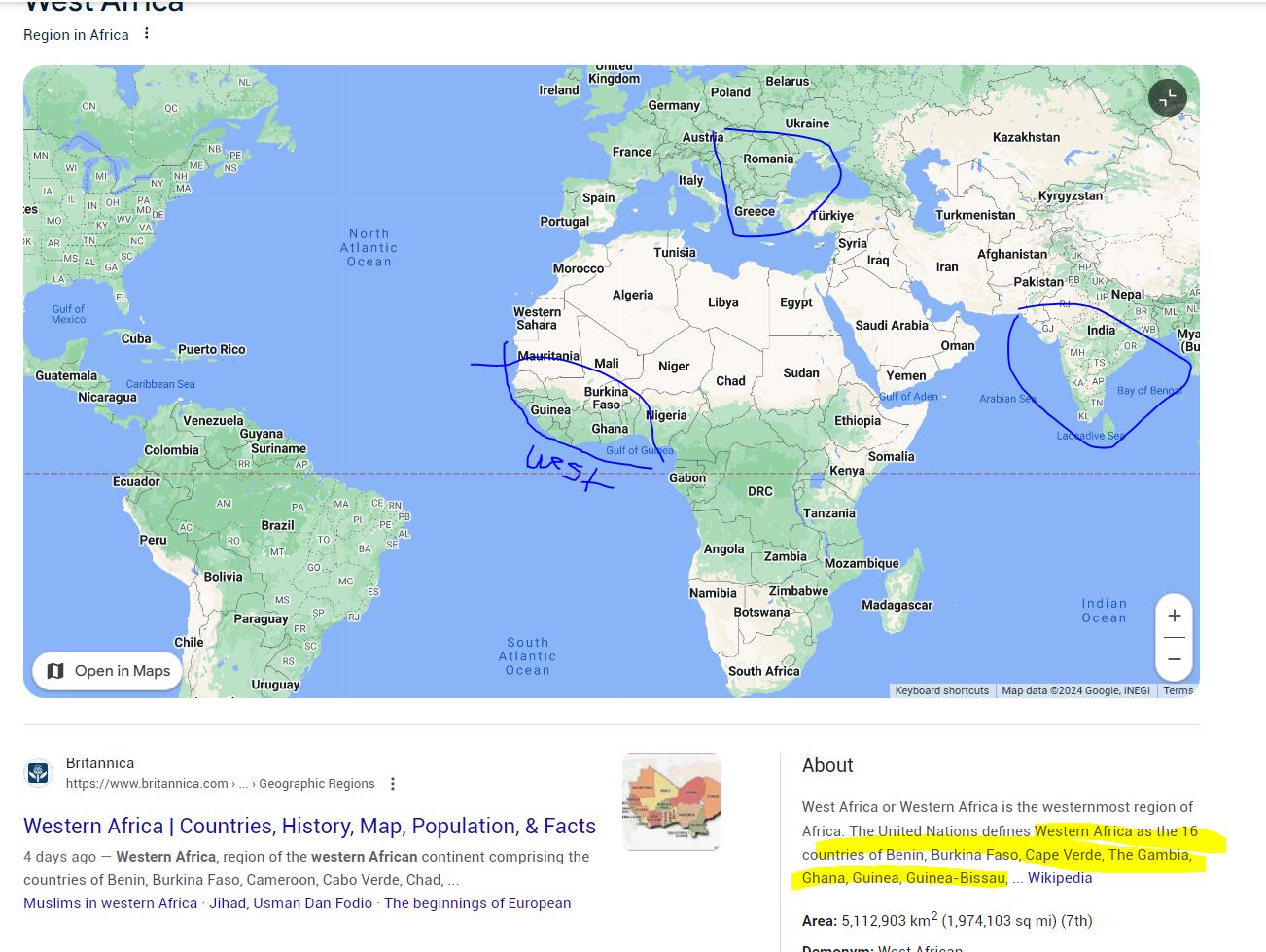
A map of the world
west Africa in relation to Greece, India Tibet which is located in the southwest of China.
Interestingly enough historians are able to find the remains of the first instrument of the neanderthal flute, but no history or remains of the “so-called Kora” The European lute made its way through Egypt through conquest.
We also know that the word Lut is old French and is “probably derived from Arabic al-ud
keyword “probably” which is not a fact, however, I dug deeper into the meaning of the word.
https://www.oxfordlearnersdictionaries.com/us/definition/english/lute
When I look up the Arabic meaning of al-‘ūd The overwhelming majority of al-words of non-Arabic origin come from Latin. Which is European.
The translation in Arabic is “Oud” meaning wood.
OUD- Dumbrill, suggests that rud came from the Sanskrit rudrī (रुद्री, meaning “string instrument”) and transferred to Arabic (a Semitic language)
Now Arabic Semetic language does not equal “African black Americans”
African Americans have appropriated various. Islamic figures, place names, texts, events, and themes in West Africa are not in any relation to North Africa or the Middle East. The Earliest known lute was the discovery of an apparent lute on an Akkadian seal, now in the British Museum, which may have pushed the known existence of the plucked lute back to c. 3100 BC. The lute’s existence in art was more plain between 2330–2000 BC (the 2nd Uruk period) when art had sufficient detail to show the instrument clearly.

The north and middle Eastern women are some of the most beautiful women in the world. They are not in any relation to American Africans
However, that may be, Simply saying the banjo is derived from Africa, which is basically in the lute family is from Africa and attributed to African American history, is extremely misleading, That’s the equivalent of Peru Claiming Argentina culture.

north African white women
Middle Eastern and North African people (MENA) have had Western American Marxists try and blackwash north Africa and the middle east however there are coin images and other historical evidence that proves black Americans are no relation or credit to the (MENA) people. The Middle East and north Africa (MENA) a distinctive culture and created the oud instrument all on its own Oud has a Distinct sound like no other and is in no way similar in sound or style to the European lute or the american banjo, It is one of the most beautiful sounding instruments ever created. It does not deserve to be plagiarized by the niger/congo Africans of the West.
The Arabic OUD seen here
https://www.youtube.com/watch?v=KA5VdzRHh-U
This instrument or its culture has absolutely no ties to black Americans, Furthermore, there is a huge distinction between west/east Africa which is a completely different culture. Egypt, Algeria, Libya, Morocco, (north Africa) and Iraq which used to be called Mesopotamia, where the Assyrians, Akkadians, and Phoenicians derived from were not black they were white or olive-skinned much like the Greeks are today.

ancient Mesopotamia women
In conclusion, this is Just another example of Marxists who have created a falsehood in order to bait black Americans into believing “ the white man” is the villain stealing from them. When it is they who have misrepresented Africa as singular when it is comprised of mostly Neanderthal whites. “Arab culture developed among the Semitic peoples of the Arabian Peninsula and Mesopotamia were white .”
Arabs and North African people aren’t “Niger” or Afro, Afro-Asiatic, Congo
|
Furthermore, I find it interesting how black Americans claim culture and its inventions from a country they have never even been to nor could probably locate it on a map. The divide between ‘black’ Sub-Saharan Africans and ‘Arab’ North Africa is Just as apparent as the Divided States of America is, if not more.
However, that may be there has been a Push for Pan-Africanism and unity, which basically is the mutual and unilateral hate for the western white Americans. Nothing brings people together like a mutual hatred.
I find it kind of ironic though they want to band together and point the finger at American colonialism when West Central and East Africa are still selling slaves present day. I find it moronic that they do not celebrate their African Kings and queens who sold them to the white man in the first place. They also don’t discuss how they were already slaves before being sold to the Americas.
I fear that we have reached a point of misinformation and propaganda, that no amount of evidence would suffice to rectify the historical discrepancies that black Americans and Marxists have spread. Because of the internet’s far-reaching capabilities, it’s far too easy for them to replicate false information and be picked up and duplicated by mainstream blogs, articles and videos echoing the spread of this misinformation. I agree, It’s important for people to know their history and preserve it, but hijacking an entire culture and invention as black fantasy is absurd, rewriting history to appease the woke Marxist is nothing but a big lie. With the rise of political correctness, many people are eager to blackwash history including those of other minorities to score racial brownie points, and it’s sick.
Do you ever sit back and think, I don’t think we are being told an accurate depiction of history? Maybe it’s because things like what is happening right now, happened then.
So you have to ask yourself is hating white people worth destroying historical accuracy so you can stroke your ego?
References:
Greek origination of Kora
https://classicalwisdom.com/culture/painting/female-artists-of-ancient-greece-kora-anaxandra-irene-and-timarete/
You can see the instrument here in a video it looks nothing like a banjo
https://www.youtube.com/watch?v=0InaUgwlrgo
Notice that her outfit has Greek symbols and Tibetan-styled clothing, even the style of singing is derived from Tibetan and Indian culture.
An american white ad for banjo makers and teachers
http://www.banjoonmyknee.com/Pics/Scanner/F&C%20Trade.jpg
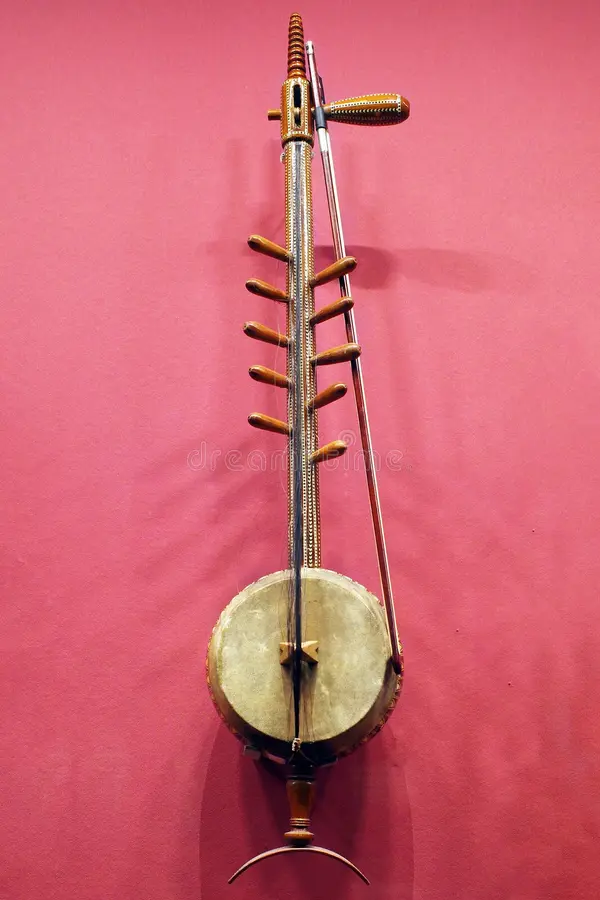
Yueqin guitar aka (moon guitar) similar to the kora but predates the kora by several centuries.
The word Banjar originates from Bali Indonesia not West Africa
https://en.wikipedia.org/wiki/Banjar_people
Mandore instrument
https://en.wikipedia.org/wiki/Mandore_(instrument)
The Medieval Lute
https://www.youtube.com/watch?v=Qq618U918f8&t=5s
Library of Congress
https://urlis.net/congress.gov
Medieval music instruments
https://www.classical-music.com/features/instruments/medieval-musical-instruments
Ancient Chinese ruan instrument
https://www.youtube.com/watch?v=3jHKK7f0GN4
Traditional Chinese Ruan
https://web.northeastern.edu/music-chinese/ruan/
13teenth-century images of the gittern and the Eastern European Koboz
https://earlymusicmuse.com/koboz2/
Neanderthal flute discovery
https://www.classicfm.com/discover-music/instruments/flute/worlds-oldest-instrument-neanderthal-flute/
https://www.youtube.com/watch?v=3agcq7fSGC8
Akkadian Empire
https://en.wikipedia.org/wiki/Akkadian_Empire
Assyrians
https://en.wikipedia.org/wiki/Assyrian_people
Oxford Dictionary Lute
https://www.oxfordlearnersdictionaries.com/us/definition/english/lute
Earlier music in 13teenth century
https://earlymusicmuse.com/category/gittern/
https://hawthorne.fastie.com/banjo/links.php
West Africa’s biggest slave port
https://www.washingtonpost.com/world/africa/an-african-country-reckons-with-its-history-of-selling-slaves/2018/01/29/5234f5aa-ff9a-11e7-86b9-8908743c79dd_story.html
Chinese Moon Guitar ( Yueqin)
https://texancultures.utsa.edu/collections-blog/object-guitar-3/

